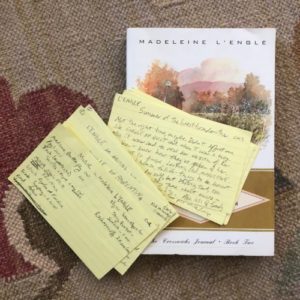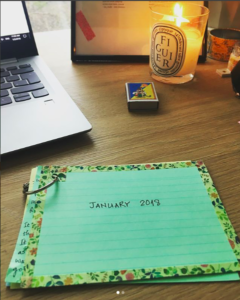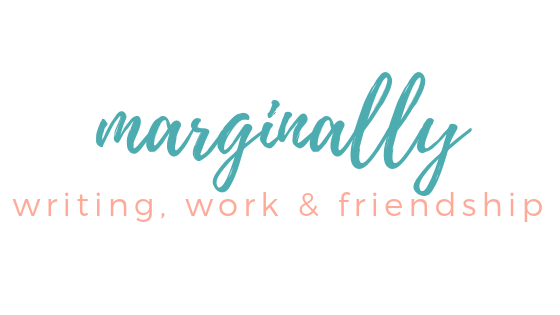Episode 103 is up, and we’re talking about You’ve Got Mail, as well as some big changes in our lives lately and how we’re handling them. Listen and check out the full show notes here, or in your favorite podcast app.
Episode 52 is here to share our big day job news
In Episode 52, we cover some great real-life stuff in a candid (read: very lightly edited) conversation.
We talk about the big day job news we were super shady about a month ago, and then we talk about how that’s changed our approach to our writing. We specifically like how making a big choice in your personal life can take away the pressure of making choices in your creative life – it’s weirdly freeing. And we talk about feeling like a writer when you’re too busy/sick to write much, and how the daydreaming and thinking about your novel is part of the novel, too.
You can find the episode and show notes here.
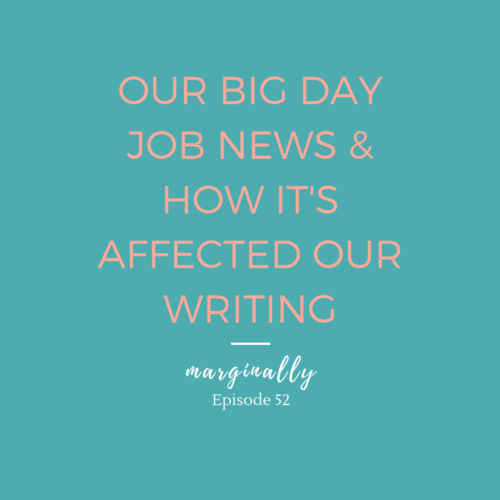
Episode 51 is all about growth
In today’s episode, we talk to Paul Jarvis, whose new book Company of One: Why Staying Small Is the Next Big Thing in Business is all about growing in a way that’s best for you and your audience. We love applying his lessons – like how to sell and market if you’re an introvert, and how to know if you’re just scared or something isn’t right – to the creative life.
The full show notes are here.
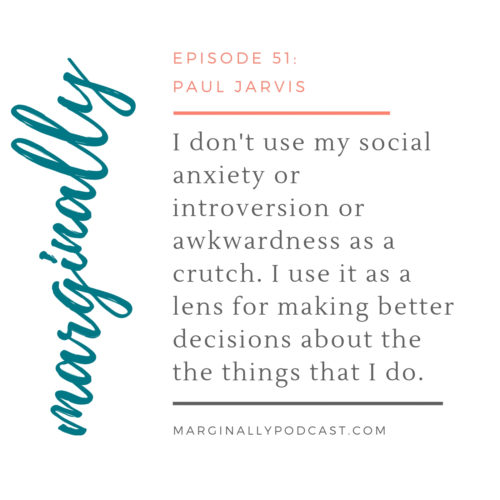
April round-up: You can do it, too
You probably already know from the podcast that I love my Google alerts. So good for keeping up with poets you like but can’t Google every day, and for keeping up with concepts you’re curious about. (My favorite Google alert is about head transplants. Read about it – it’s a thing.)
Anyway, I also have a series of alerts about writing and day jobs, and so we are starting a monthly round-up of stories of other people who are writing their books and getting published – all while not writing full-time. Read about them, and know that you can do it, too!
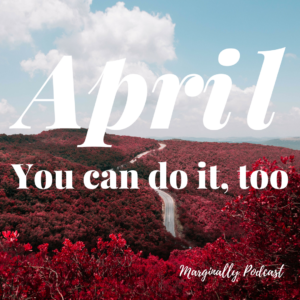
The April Round-Up:
Financial Times‘s profile of corporate workplace novelist and HR professional Jillian Medoff. She wrote on weekends and in the evenings. Her website is here, and her latest book, published earlier this year, is This Could Hurt.
The Observer published this profile of Hanya Yanagihara, who works as a journalist in her day job and published the critically acclaimed A Little Life a couple years ago. The interview and profile are engaging and fun to read, and she’s a big advocate of the day job:
In Yanagihara’s case, returning to the magazine world was a question of disposition and financial necessity. While a big seller by the standards of literary fiction, A Little Life was hardly Fifty Shades of Grey and Yanagihara lives in an apartment in downtown Manhattan with overheads that serious novels don’t support. It’s a stylish life and while she is dressed today in workman-like denim, an advertisement for the daylight-hours side of her nature, elsewhere whimsy reigns.
Canada’s Globe and Mail published this profile of lawyer and author of 8 books Catherine McKenzie. Her latest book is The Good Liar; her site is here. I enjoyed reading about the different genres she’s written in, and her overall path to being more confident in her writing. I also liked how they played on the “on the side” theme for this bio:
Instead, McKenzie’s Montreal fans learned that the novelist is a lawyer on the side. Or rather that, on the side of her 18-year legal career, which has taken her to the Supreme Court of Canada five times, she writes novels.
FemaleFirst.co.uk’s profile of the UK writer and former medical secretary Sheila Norton. She wrote her first 8 (of 18!) books in her spare time while working. Her latest book is The Pets at Primrose Cottage, and this is her website.
This roundup of young Australian authors has a good blurb on Shaun Prescott, a tech and gaming writer, as well as a novelist of the new book The Town.
In this profile in the Pacific Daily News, Michael Perez worked for decades in the Guam Department of Education, and has just published a book about an autistic girl, The Scream of Innocence.
This is a little out of tune with our “keep your day job” theme, but I still enjoyed this Guardian profile of the UK novelist Sarah Perry, whose The Essex Serpent has been really popular there and abroad in the past year. It starts strong, and keeps going well:
My first book was published when I was 34. I was at that time a copywriter, earning a living by removing errant apostrophes from clothing catalogues, and drafting news reports for legal journals. Before then, I had been a civil servant (a job to which I was ill-suited in every respect), a minimum-wage shop worker, a nanny, an office temp and a legal administrator. Often I am asked what possessed me to join the civil service straight after graduation, and the frank answer is that I had supported myself financially since I was 18, and needed to earn a living: writing, my long-held ambition, would have to wait.
… It never occurred to me that I would be able to make a living from writing fiction, and I did not in the least resent my day job, though naturally I occasionally imagined finding a hoard of Saxon gold in the back garden.
And, it turns out Agatha Christie worked as an apothecary. Which makes a lot of sense for her books.
This week, we’re pepping you up
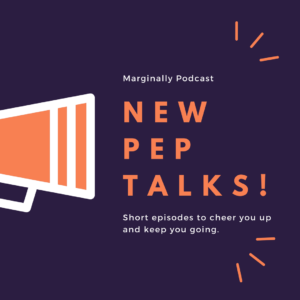
Meghan and I have both had a lot of work travel, and we have also been recording pep talks that we wanted to share with you. So, instead of a full-length episode, we have not just one but three pep talks to share:
Pep Talk #4 from our Episode 33 interview with poet and book publicist Abigail Welhouse, where she reminds us that people probably don’t care, but if they do, it’s such an amazing gift. And that writing is all about connection:
Pep Talk #5 from Meghan that should calm your nerves if you’re in one of those times where you’re not writing. Are you still “a writer”? Listen to this:
And Pep Talk #6 is a real-life conversation that Olivia and Meghan had, when Olivia wasn’t sure if she should continue with this novel, her first. Meghan had some great words of advice:
All our Pep Talks can be found here on our new Pep Talk page.
Don’t miss an episode! Subscribe to Marginally on iTunes, Stitcher, Google Play, or wherever get your podcasts.
Asking for help
I was just writing to Meghan last night that I really love that we have started this podcast now, when we’re in the middle of our first real creative projects. It means that we have a chance to document and share the micro-lessons that we are learning. Most importantly, we can keep them for ourselves for next time. Whatever happens to our current books, we have so many ideas, and so we can come back to this blog and our podcast (especially our pep talks) and remind ourselves what we’ve already learned.
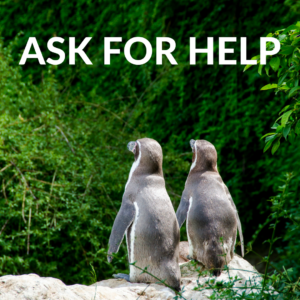
This week, I’ve been learning a micro-lesson about asking for help. This is something I can use in all areas of my life, something I should remember better than I do, and more often. I always find it hard, but it is harder for me about writing because it is something I do for myself, not for my job or family or other people.
So it seems like a scary thing to prioritize, and something I don’t have much confidence about. Some tiny voices in me say things like this:
What if this is just a stupid pile of poop that I am writing? Why should I ask for time or help with it?
It’s not my real job, so why should I prioritize it? It’s never going to turn into anything?
And so on. I’m sure some of you have a similar helpful voice in your head.
And then it’s like I’m wrestling this whole novel by myself, and all my ideas, and as soon as I shut the Word document, I only remember how much work there is left, and everything is terrible (as we like to say on the online radio show).
A couple weekends ago, I went to a yin/relaxation yoga workshop (led by our former guest in Ep14 Divya Kohli, who has such a gift and I especially love her yin/relaxation workshops) with two of my best London friends. We had such a wonderful time on and off the mat together, exploring Budapest and talking for three days. Since then I’ve just felt so much more open and grounded on one hand, but also have been facing and allowing myself to feel the things that are difficult.
That’s a tough combination, though – you’re open to and suddenly hearing and feeling the scary voices, and not just saying, “Shhhh…. I’ll deal with you later” (which is actually a way of saying to them, “Keep talking!”).
So I started asking for help. A couple examples:
First, I talked to my boss and said I needed to take more time away, at least writing in the morning, even if I am working in the afternoons. I’m potentially going for promotion later this year, so I was planning to have this talk after that was successful, but instead I thought I’d bring it up now, so I wouldn’t be telling myself for months that it may not be possible to get. Guess what? He was fine – basically, if I can arrange my schedule and make sure all the projects are covered, he is happy for me to do that. I am lucky because I lead a team, so I can sort of flex things to fit around me, but I’m also in consulting, and clients can be demanding. But I got the theoretical “okay,” and I feel a lot better. And it’s because I asked for help.
Second, I sent Meghan a panicky voice message about how I should probably quit my book and so on, and she is fantastic, so she sent me a voice message back with lots of encouragement. It was such a great exchange that we are going to turn that into a little pep talk for you guys, although originally it was just our normal conversation.
Third, I wrote my writing mentor and asked her, “I need to know if I should continue with this book. It is probably weird for me to ask you this, and you’ll probably say only I can decide, but I haven’t done this before and I don’t have anyone else to ask and you just read it.” That’s not an actual copy of what I wrote her, but it’s close. And I think, by writing it, I already knew the answer, but it was so important for me to share that HUGE QUESTION with someone else, and ask them to help me with it. And she did (she said I should continue).
So, guys, and Future Me: don’t wrestle monsters by yourself. Call your friends. Ask your boss (if it’s possible). Ask someone else the questions that feel like they are eating you in the middle of the night.
Do you write on your commute?
Yesterday I saw this article on TheMillions blog about Fiona Mozley, a writer with a 9-to-6 job who started writing her Man-Booker-Prize-finalist novel Elmet on her commute. I really liked this quote from her:
the sentences and paragraphs I wrote on my phone during my commute were very useful for keeping up the momentum. Sometimes when you’re writing–particularly if you’re working full time–you can have periods of writing nothing at all. Even if I found myself unable to write full sections, jotting ideas down on my phone meant that I felt a constant sense of progression.
I really liked this, and I liked her journey that she went on – from writing as an escape from a job and from a life that wasn’t working for her, to moving out of London and gradually building up confidence through part-time work. It is a good article just to get a sense of one writer’s journey.
I am not usually a commuter-writer; in my Eastern Europe city, I walk to work, and in London I was usually on a crowded Tube car. But I totally get the appeal – even apart from the obvious aspects that it’s just a chunk of time you can’t ever get back. I have done it a few times, when something was burning in my head, or when I just didn’t feel right and I needed to get it down. I have written a couple of really powerful scenes or parts of scenes in the Tube, and I always feel like I’m on fire, and like I have an important secret that is somehow also public (you’re surrounded by people, after all), and it does feel like magic.
As writers (and as podcast hosts!) sometimes we read the news about different writers’ routines to find out the magic formula, what can help us to finish our novel or inspire people. But when you really break it down, like this article does, it’s just about making small steps that turn into big leaps – and suddenly you’re writing a real book.
With Mozley, maybe if she’d thought about quitting her job to do a PhD when she first started, it would have sounded like too much, too hard (I don’t know, just speculating). But after she’s spent hours and days on this book, maybe it felt more possible – more and different things feel possible about writing once you start doing the actual writing when you can. Once you start working writing into your life, it also changes your life.
Writing on your commute, like writing during your lunch break or before or work or after work, is a signal that you’re taking yourself and your private, secret work seriously. And that can be hard when you’re working full-time, or when you’re caring for others full-time, or anything else you think you should pay more attention to than your own projects. But still we do it. We wake up early, or we huddle into our jackets and write away on a tiny notebook so no one can watch us on the train. We start typing ideas in our phones, or we try to type some sentences on the Tube or train.
It helps us to become who we are, and the practice of doing it helps us to find out who we are, too.
On Episode 27, Hamid Ismailov reminds us how a day job can help your writing
In today’s episode, we talked to the BBC journalist and prolific novelist Hamid Ismailov. Hamid has a fascinating day job – Editor of the Central Asia service at the BBC World Service – but he still makes time in evenings several months a year to write novels. He shared with us his system for averaging one novel for year, but still having time to daydream about your next project(s), and why he doesn’t want to quit his day job.

Hamid is the author of numerous books in Russian and Uzbek, which have been translated into English and many other languages. His most recent book is The Devils’ Dance. One of his first books to receive widespread acclaim in English is The Railway, which has an untraditional, folkloric structure and many fantastic characters. Since then, in English he has published several books, including The Dead Lake, about the area of Kazakhstan where nuclear testing had occurred previously, an elegy about Moscow called The Underground, and A Poet and Bin Laden, and many more books and artistic projects that have not been tranlsated. He was formerly the BBC’s Writer in Residence, and during that time he wrote many lovely blog posts.
We enjoyed talking to him, and we think you’ll learn from and be inspired by our discussion with him this week.
Full show notes are here.
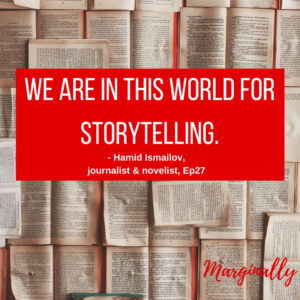
25 Ways of Getting Over Getting It Out There – Guest Pep Talk
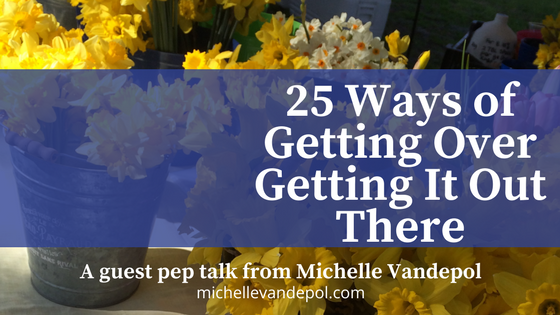
Hi margin-writers! We’re excited to have a guest pep talk today from writer and editor Michelle Vandepol. Last week, we shared our lessons learned (so far) from starting a podcast over on Michelle’s website, and this week, she’s sharing this excellent pep talk. I think we got the better end of the deal 🙂 I’ll be working on 19 and 21! -Meghan
A Word of Encouragement for Taking the Next Step in your Writing Career
Getting over “getting it out there” is part of every writer’s life. Today’s writers need to conjure up courage not only to submit to the usual sources of publication but also to click publish on the social media platforms that are part of the writer’s package expected by agents, editors, and readers.
Whether you are thinking about launching your blog or e-book, submitting to a contest or new market, or reaching out to collaborate with other writers on your social media platform; it is often better to click send a bit before you feel ready. You will have some no’s and some yes’s either way. Waiting doesn’t increase your odds. Take your time to prepare, sure, but if you don’t get in the game until you feel ready; you may be unnecessarily slowing yourself down.
Is it possible things won’t look as polished as they will down the line? Most definitely. You will get better as you go along. Will some people turn you down? Not the right ones. You are meant to carry out that artistic dream that it on your heart. I’m not talking about big risk like bankrolling a writing business start-up with your line of credit. This is just coming up with a strategy to move forward and then persistently executing on it.
Here are 25 ways to get over getting it out there. Use them to put together a strategy that works for you.
Get Social
- Decide which social media platform you are going to focus your attention on
- Build community through participating in and hosting online challenges
- Schedule an editorial calendar to keep your postings consistent
- Contribute helpful content to your niche market on forums and in groups
- Spend time away from social media as well to recharge and get creative
Pound the Pavement
- Query a magazine you like with an article or story idea
- Read your work at an open mic night
- Reach out to other writers and arrange guest posts or features
- Offer to lead a community workshop
- Recruit like minded folks for a writing group
Draft some Deadlines
- Set a regular day of the week for queries, blog posts, or social media features
- Attach a year-long countdown widget to your blog or social media platform to promote a launch
- Outline down a year’s worth of author newsletters or your next novel
- Establish a list of short story ideas to write & send out (2 stories/month is a collection at year’s end)
- Negotiate dates for exchange of guest posts to give yourself a submission & posting schedule
Focus on a Quality Few
- Spend a bit of research time on your favourite social media platform and hone your own branding
- Settle on a key project for this year with supporting acts if time allows
- Evaluate what has been working and what has not, and cut something out
- Determine your rhythm: some hours work best for writing and some are best for the business side 20. Select your beta reader audience- who appreciates your genre and can tell you like it is?
Consider your Vision
- Investigate what does your ideal writing life looks like. What components can you incorporate now?
- Analyze what brings you joy to write and share about. That is likely part of your voice.
- Affirm yourself for your vision. It will not appeal to everyone and that’s ok. It’s yours.
- Track your habits in a bullet journal. Are you noticing any changes? growth? clarity?
- Write your bio for current day you and then for future you. What milestones have you highlighted?
Bio: Michelle Vandepol is a writer, editor, and bookish Canadian who loves connecting with other readers and writers on instagram at @michellevandepol . For more articles on the writing life, visit her website www.michellevandepol.
Episode 25 answers your burning questions about answering questions
Today, we answer a listener question from Maria, who wanted to know how we approach research. We talk about how all books need research, not just nonfiction historical fiction, when to google and when to ask someone, the stages of research, and our tools and processes.
Next week will be our monthly writing prompt episode, so don’t forget to send in your responses! All our prompts are here, and even if you don’t want us to share yours on air, we’ll still send you a critique and enter you into our drawing for fun writer mail.
You can listen to the full episode and get show notes here.
Let us know — how do you handle research? What are your favorite tools and methods?
